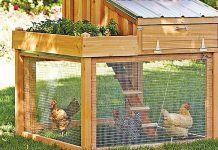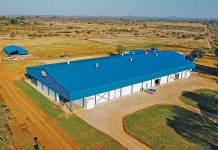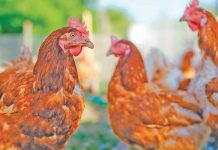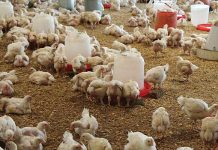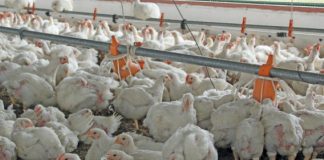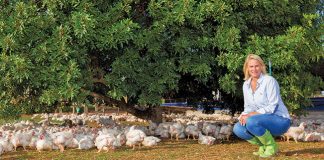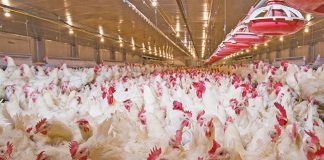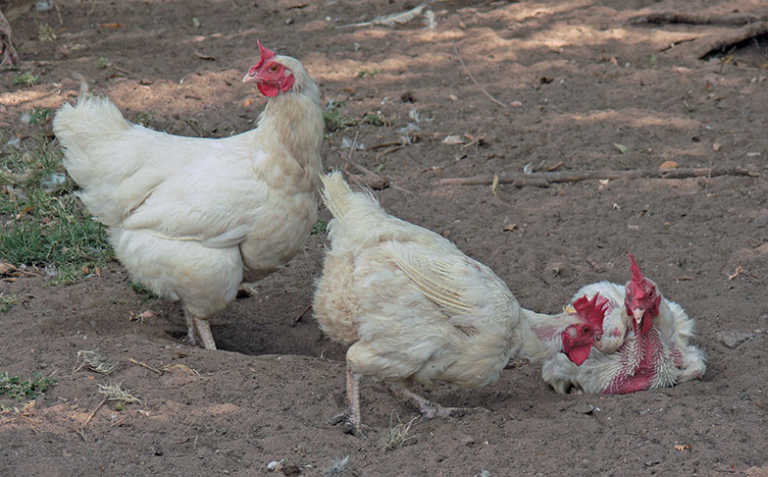
Photo: Chris Nel
Thorntree Farm is a family owned and managed poultry farm off the beaten track near Rhenosterfontein, east of Pretoria.
It produces high-quality chicken eggs, mainly in a conventional intensive cage operation, but also free-range for a small, but important and growing, niche market.
The balance of production is currently around 95:5 in favour of the intensive system.
Operating two systems with hens of the same strain and age on the same ration enables production for divergent markets, as well as the opportunity to continually compare the quality, performance and economic criteria of the two systems.
READ Securing a market for your chickens
The intensive operation, with 15 houses and an average of 40 000 hens, has been in production since the 1990s. The free-range operation, averaging around 2 000 hens in three units, was started around 1997.
Today the team of Sean Store (marketing), Ryan ‘Steg’ Stegmann (egg farm manager), Kirsten Stegmann, Surgeon Mmotong and Raymond Talisa run the operations in parallel.
The hens in both receive the same Nova ration, free of steroids, hormones and other additives.
“As it is difficult to get GM-free maize in South Africa these days, the GM content of the ration is uncertain,” says Steg.
Housing the hens
Throughout the year, the free-range hens are housed in three groups in rotation in three of four housing units, explains Steg.
A housing unit consists of a steel shed, opening into a large outdoor camp where the hens freely roam and forage by day. Densely foliaged indigenous and non-indigenous trees in the camps provide shade and additional roosting.
READ Basic infrastructure for small-scale pig farming
Although the hens have a choice of nesting both indoors and outdoors, some prefer to lay in their own secret, outdoor nests hidden away in the undergrowth.
The hens are closed up in the shed at night for their protection.
Each housing unit is of a different size and thus can accommodate its own optimum number of hens. Thorntree Farm’s free-range stocking rate averages around
4,6 hens/m² shed floor space.
The outdoor foraging area far exceeds the hens’ needs, with an absolute maximum of around one hen/m².
However, because the camp’s nature changes over time as the hens scratch around and forage in it, it has to be temporarily withdrawn from production from time to time.
The hens then go into the rested unit for between seven and 28 days according to rainfall and season, enabling the vacated camp to recover.
Thus, at any point in time, this rotation uses three of four available units, each consisting of a shed and adjoining outdoor camp.
Free-range hens are fed twice daily in troughs and feeders. Additional feed, randomly scattered throughout the camp, encourages them to dig, scratch and forage, and eat whatever natural plant and animal food this environment provides.
Drinking water, sourced from a borehole, is freely available. The hens select their own scratching and dust bathing areas scattered throughout the camp.
As Steg has found no measurable benefit to justify the expense, he does not add diatomaceous earth to these areas.
A breed for two systems
In both intensive and free-range operations, Thorntree Farm uses Hy-Line Silver hens supplied by Almur Smit. One batch of hens, at 16 weeks of age, is delivered to the farm every month.
They arrive before point of lay, having undergone a 12-step data-verified vaccination procedure for diseases such as infectious bronchitis and Newcastle disease.
After adaptation on Thorntree Farm, they go into egg production at 17 to 19 weeks. The average productive lifespan of a hen is 18 to 22 months, during which time it moults once and averages 315 eggs/year.
As hens in the production groups are of different ages, they moult at different times. So, at any point in time, hens in different stages of moult can be found in the same camp.
Eggs are manually collected twice a day. Each is candled and those with dirty shells are cleaned.
Cracked and reject eggs are pulped, frozen and supplied to a company that pasteurises and processes the material into various commercial by-products.
The selected eggs are graded by weight in an automated counterweight system according to the standard South African grading sizes as stipulated by the Department of Agriculture.
An official from the department visits from time to time to ensure the system, equipment and product are up to standard.
Skilled packers with nimble fingers pack the eggs daily. The eggs are delivered to customers mostly within 24 hours of being collected, but always within 48 hours.
Pests and diseases
Rodents and occasional theft are the main economic problems. Pest control, owls and a crossbred terrier with a kindness towards chickens but a keen eye and nose for rats take care of the first; a stable, honest and happy workforce of the second.
Due to the modest stocking rate, disease and parasite problems are negligible and addressed by bio-security and vaccination.
READ Chicken care: preventing diseases
Should a disease problem arise, which is very rare, it’s handled accordingly. Should mortality exceed the norm, the hens are monitored daily to address health and feed intake. This ensures a very low mortality rate of 1%.
Spent hens are sold live to a few regular customers, who collect them outside the farm’s bio-security barrier.
“Comparing key data from the intensive and free-range system shows slightly more wastage in the free-range system,” says Steg.
“They also eat around 10% more feed. But the free-range hen is a happy hen, doing what a hen should be doing.
“Unfortunately, this is not a perfect world and waste means loss, especially in a small operation such as ours. But we monitor and strictly manage everything to limit this loss.”
To offset the slightly higher production cost, the demand for free-range eggs in this small, select market fortunately warrants a higher selling price.
Thorntree Farm eggs, whether produced free range or conventionally, are available at selected supermarkets, specialist food stores and butcheries in Johannesburg, as well as in the east of Pretoria.
As for their long-term plans, “if the market justifies it, we would like to expand free-range production to 50%,” says Steg. “In the very long-term, we would like to mill our own feed.”
Phone Ryan ‘Steg’ Stegmann on 083 449 7397, or email him at [email protected].



